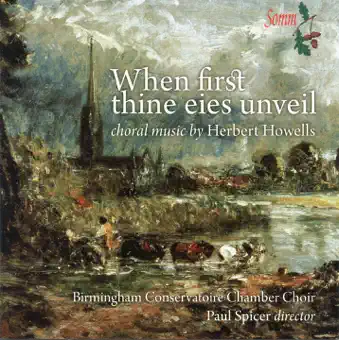december 2014
Howells: When First Thine Eies Unveil
Birmingham Conservatoire Chamber Choir o.l.v. Paul Spicer
Rarities en premières – een nieuw inzicht in Howells werk. Deze en de andere werken op de cd worden allemaal gezongen met een ontroerende intimiteit en reflectie.

Er is iets duidelijk numineus aan het geluid van Howells’ koormuziek, vooral voor onbegeleid koor, en in de handen van een van zijn specialisten, Paul Spicer, krijgt het een grotere rijkdom en inzicht in de frasering van de lange, contrapuntische lijnen van de componist. Deze opname mengt seculier en sacraal, net zoals Ralph Allwoods prachtige opname met het Rodolfus Choir dat deed; beide koren delen een jeugdig, iriserend karakter, hoewel Spicers mix misschien de voorsprong heeft (hoewel ik in dit programma meerstemmige liederen mis zoals ‘The summer is coming’). De vroege Mis in de Dorische modus en O salutaris hostia (die Spicer voor het eerst opnam op Chandos in 1992 met de meer volwassen sonoriteit van de Finzi Singers – 12/92) worden gezongen met controle en rust. We worden ook getrakteerd op drie première-opnames: het begeleide volkslied When first thine eies reveal (de tegenhanger van het bekendere My eyes for beauty pine), O mortal man, dat gebruikmaakt van de Sussex Mummers’ Carol, en het beschouwende huwelijkslied Levavi oculos meos voor sopranen en orgel, hier met grote gevoeligheid en warmte gezongen. De twee vijfstemmige madrigalen In youth is pleasure en Before me careless lying – producten van oorlogstijd – worden met grote levendigheid gezongen en getuigen van Howells’ verliefdheid op de Tudor-kunst. Maar voor die ongrijpbare intensiteit en mystieke atmosfeer bieden de linguïstische amalgaam van sonore koortexturen, huiveringwekkende klankmomenten en meervoudige expressieve appoggiatura's in Walking in the snow en het magische Long, long ago het meest welsprekende en persoonlijke inzicht in de innerlijke wereld van de componist. Een prachtige cd.

There is something distinctly numinous about the sound of Howells’s choral music, especially for unaccompanied choir, and in the hands of one of its specialists, Paul Spicer, it acquires an enhanced richness and insight into the phrasing of the composer’s long, contrapuntal lines. This recording mixes secular and sacred, just as Ralph Allwood’s fine recording with the Rodolfus Choir did; both choirs share a youthful, iridescent character, although Spicer’s blend perhaps has the edge (though I miss in this programme part-songs such as ‘The summer is coming’). The early Mass in the Dorian Mode and O salutaris hostia (which Spicer recorded for the first time on Chandos back in 1992 with the more mature sonority of the Finzi Singers – 12/92) is sung with control and tranquillity. We are also treated to three premiere recordings: the accompanied anthem When first thine eies unveil (the counterpart of the better-known My eyes for beauty pine), O mortal man, which uses the Sussex Mummers’ Carol, and the contemplative wedding anthem Levavi oculos meos for sopranos and organ, sung with great sensitivity and warmth here. The two five-part madrigals In youth is pleasure and Before me careless lying – products of wartime – are sung with great vivacity and bear witness to Howells’s infatuation with the Tudor art. But for that intangible intensity and mystical atmosphere, the linguistic amalgam of sonorous choral textures, spine-shivering sound-moments and multiple expressive appoggiaturas in Walking in the snow and the magical Long, long ago offer the most eloquent and personal insight into the composer’s inner world. A lovely CD.
